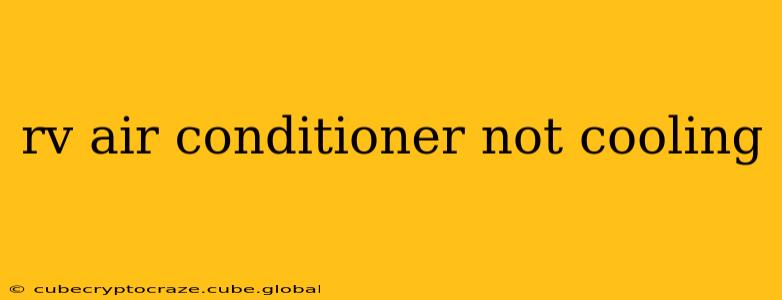Is your RV air conditioner struggling to keep you cool? A malfunctioning RV AC unit can quickly turn a relaxing getaway into a sweaty ordeal. This comprehensive guide will help you diagnose the problem and find effective solutions, saving you time, money, and frustration. We'll cover common issues, troubleshooting steps, and preventative maintenance to keep your RV cool and comfortable all season long.
Why Is My RV Air Conditioner Not Working?
This is the most common question RV owners ask when faced with a malfunctioning AC unit. Several factors can contribute to poor cooling performance. Let's break down the most frequent culprits:
Low Refrigerant:
This is often the primary reason for inadequate cooling. Refrigerant is the substance that absorbs heat from inside your RV and releases it outside. Over time, leaks can deplete the refrigerant, leading to insufficient cooling. Identifying a refrigerant leak requires professional assistance. You should never attempt to handle refrigerant yourself, as it can be dangerous.
Clogged Air Filter:
A dirty air filter restricts airflow, preventing the AC unit from efficiently cooling the air. This is an easy fix – simply replace or clean the filter regularly.
Frozen Evaporator Coil:
Restricted airflow (due to a clogged filter or other obstructions) can cause the evaporator coil to freeze. This ice buildup will prevent proper cooling. Addressing this requires locating the source of the airflow restriction.
Faulty Compressor:
The compressor is the heart of your AC system, responsible for circulating the refrigerant. A malfunctioning compressor will significantly reduce or eliminate cooling capacity. This is often a costly repair and may require professional service.
Electrical Problems:
Issues with the power supply, wiring, or the AC unit's internal components can prevent the system from functioning correctly. Check the breakers, fuses, and wiring connections. If you're not comfortable working with electricity, call a qualified technician.
Condenser Problems:
The condenser unit, located outside, releases heat. If it's dirty, clogged, or damaged, it won't be able to dissipate heat effectively, hindering the AC's cooling performance. Cleaning the condenser fins is crucial for optimal performance.
Incorrect Thermostat Settings:
Double-check your thermostat settings. Ensure it's turned on, set to the correct cooling mode, and the temperature is appropriately low.
How Can I Fix My RV Air Conditioner?
The complexity of repairs depends on the underlying problem. Simple issues, like a clogged air filter, can be addressed easily by the RV owner. More involved issues, like compressor failure or refrigerant leaks, require professional intervention.
Cleaning the Air Filter:
This is the first thing to check. Locate the air filter (usually accessible from inside the RV near the AC unit) and clean or replace it as needed. A clean filter dramatically improves airflow and cooling efficiency.
Cleaning the Condenser:
The condenser coils, located on the outside of your RV, can get clogged with dust, leaves, and debris. Use a condenser coil cleaning brush or a shop vacuum to gently clean the fins. This will improve heat dissipation and enhance cooling.
How Often Should I Replace My RV AC Filter?
You should replace your RV air filter every 30-60 days, or more frequently if you're using your RV in dusty or dirty environments. Consistent filter changes prevent performance issues and extend the lifespan of your AC unit.
Is My RV AC Unit Low on Refrigerant?
You can't easily check refrigerant levels yourself. Low refrigerant necessitates professional service. A qualified technician can identify leaks and properly recharge the system. Attempting to handle refrigerant without proper training can be hazardous.
What Are the Signs of a Bad RV AC Compressor?
A failing compressor might produce unusual noises (clicking, rattling, or humming), have decreased cooling capacity, or fail to start altogether. If you suspect compressor failure, seek professional help immediately.
Why is My RV AC Blowing Warm Air?
Warm air usually indicates a refrigerant leak, a faulty compressor, or a problem with the electrical components. Immediate professional assistance is crucial to resolve this issue and prevent further damage.
How Can I Prevent RV AC Problems?
Regular maintenance is key to preventing problems. This includes:
- Regular air filter changes: As mentioned, change the filter regularly.
- Annual professional inspection: Have a qualified technician inspect your system annually.
- Cleaning the condenser coils: Clean the condenser coils at least once a season, or more often if needed.
- Proper ventilation: Ensure proper ventilation around the AC unit to allow for efficient heat dissipation.
By following these tips and addressing problems promptly, you can keep your RV AC unit running smoothly and ensure a cool and comfortable experience on your next adventure. Remember that some repairs require professional expertise. Don't hesitate to consult a qualified RV technician for more complex issues.
